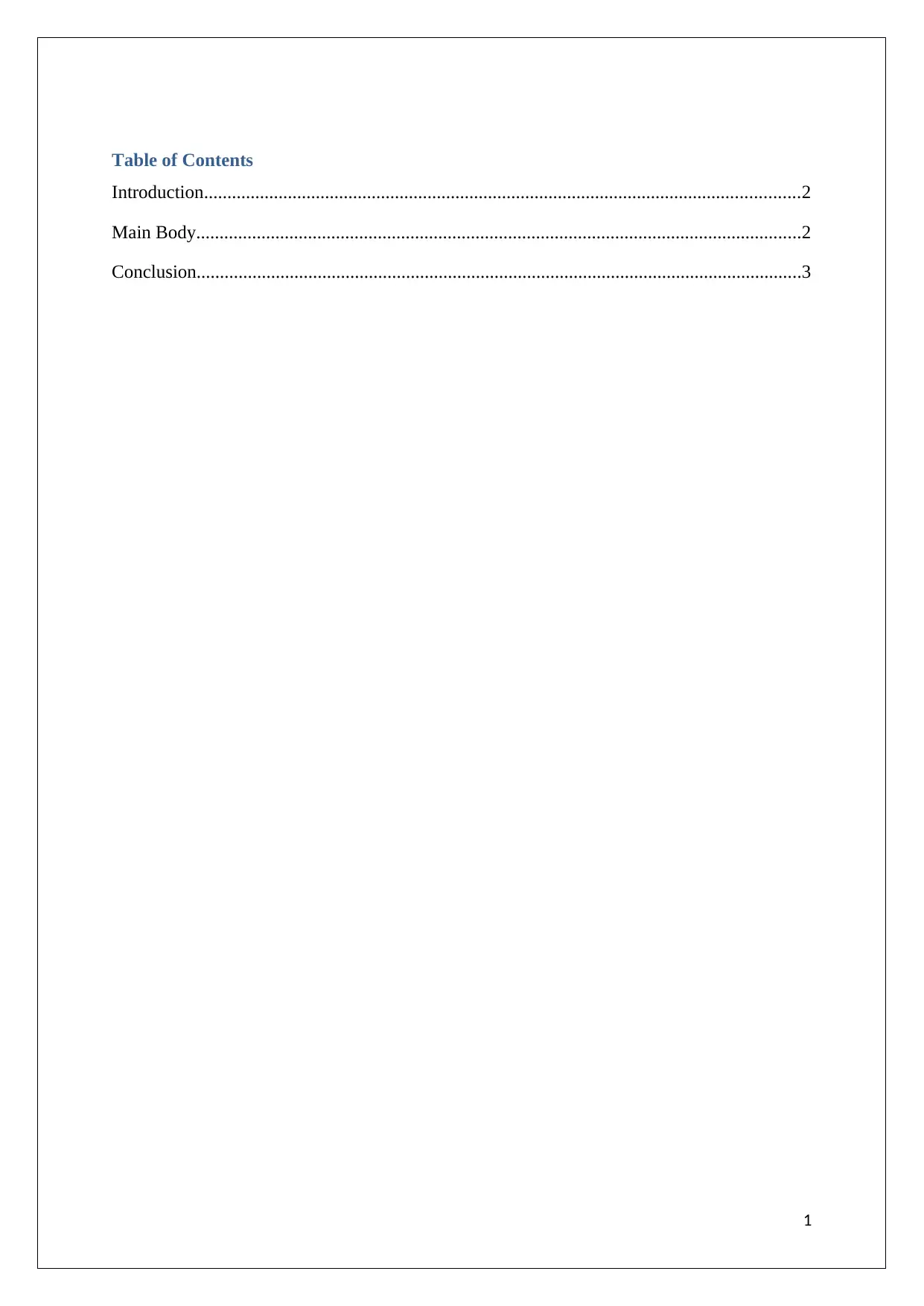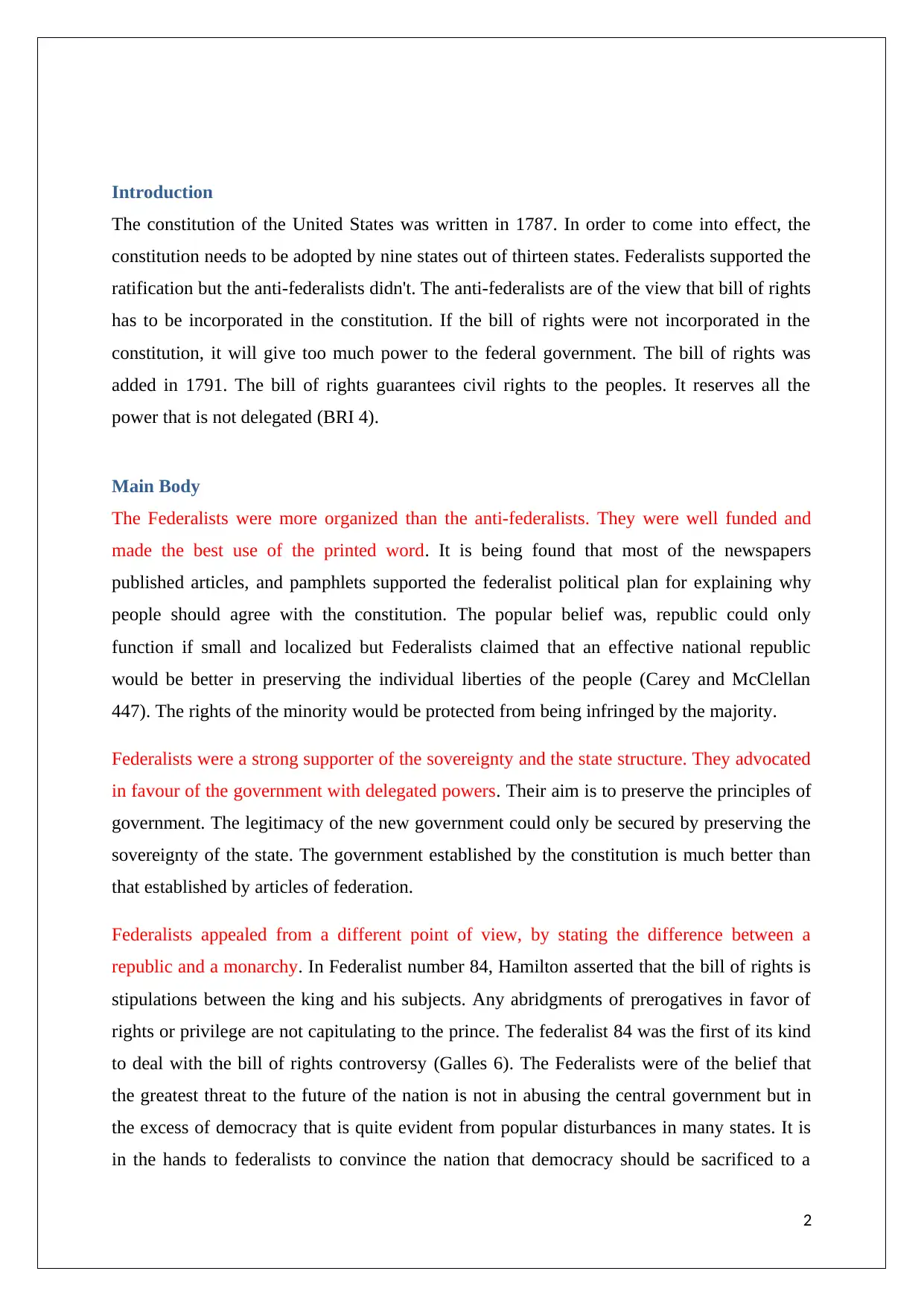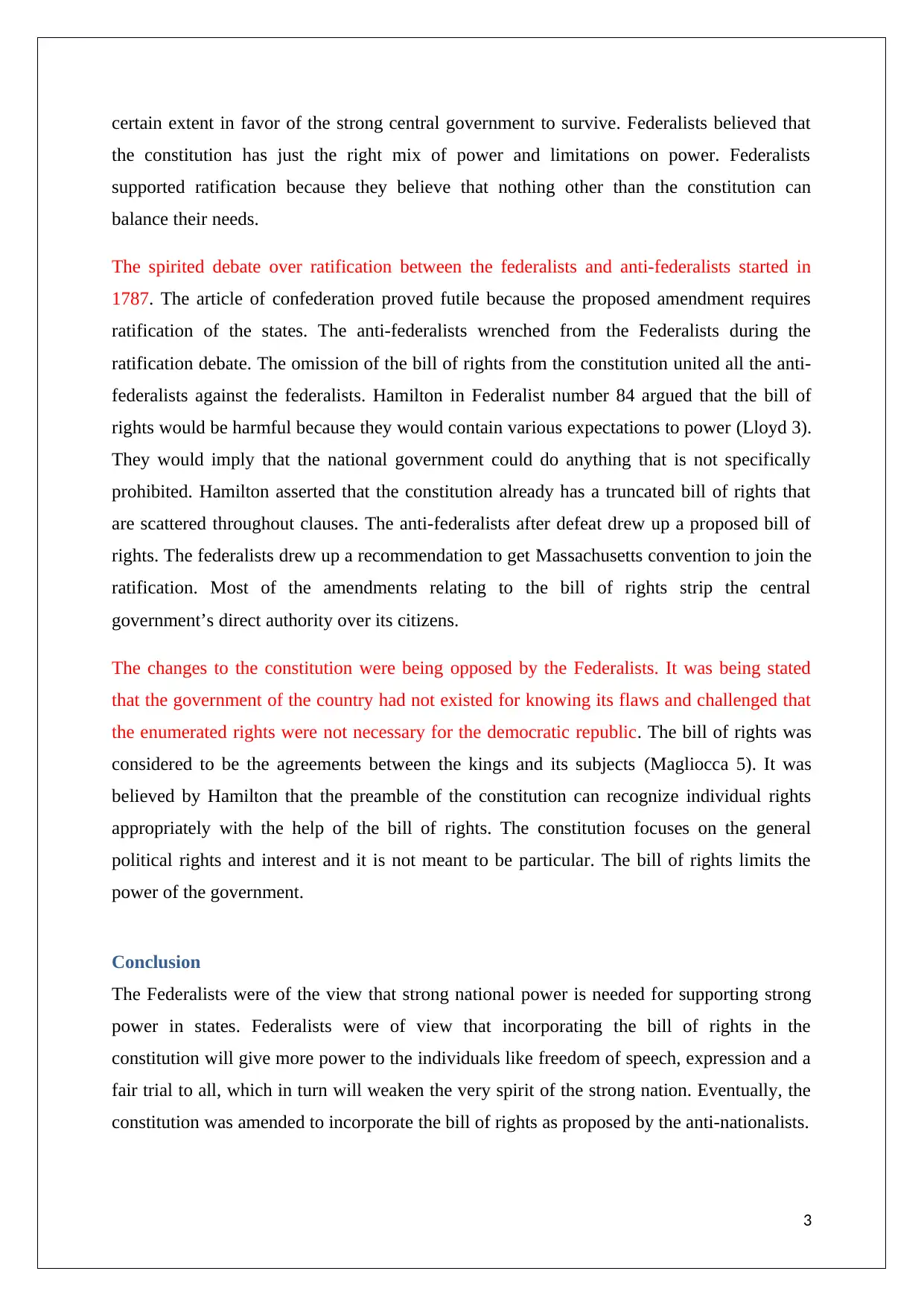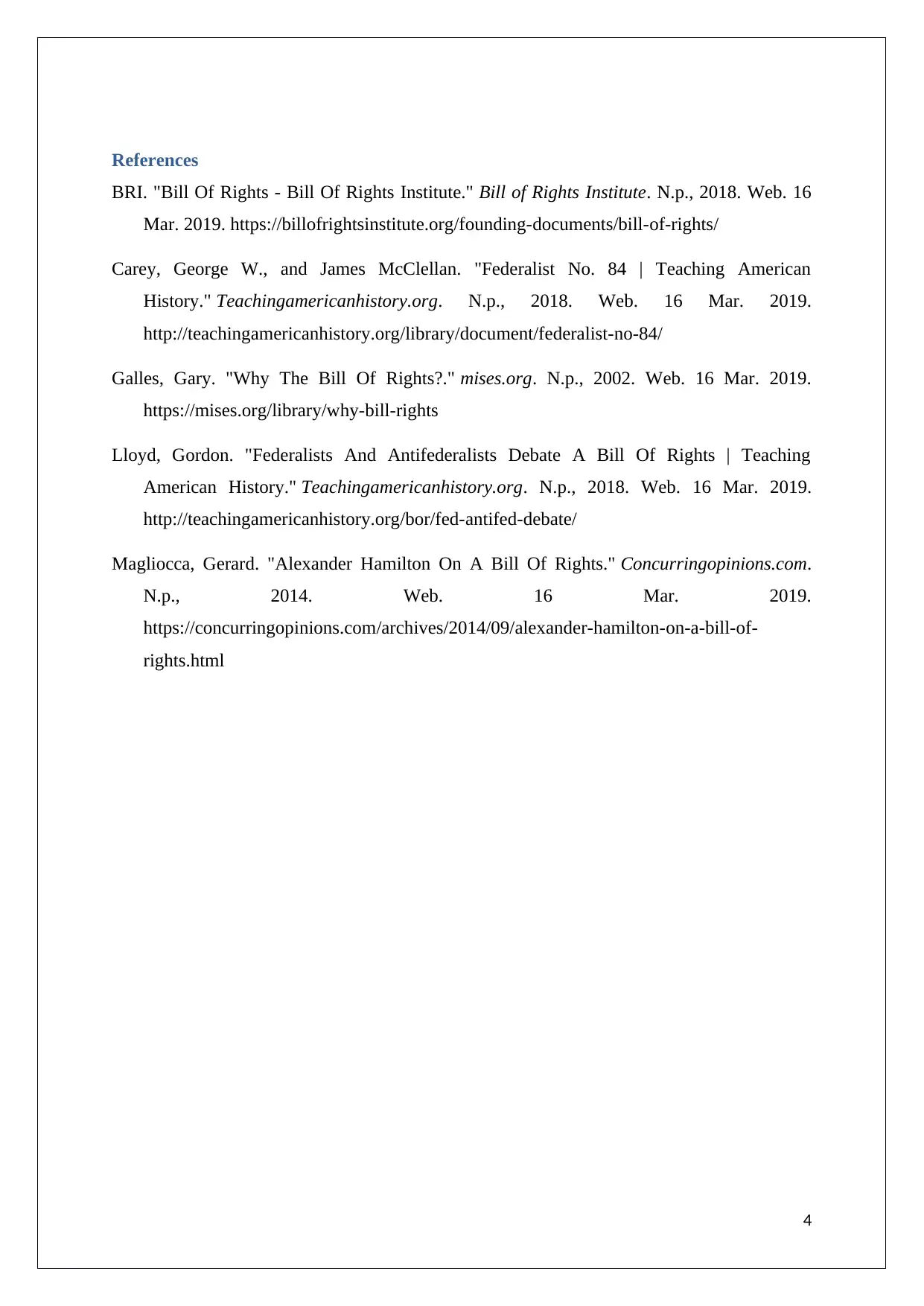Sociology Essay: Examining the Federalist and Anti-Federalist Conflict
VerifiedAdded on 2023/04/07
|5
|892
|369
Essay
AI Summary
This sociology essay examines the historical debate between Federalists and Anti-Federalists concerning the ratification of the United States Constitution in 1787. The essay explores the core arguments of both sides, focusing on the Federalists' support for a strong central government and the Anti-Federalists' insistence on a Bill of Rights to protect individual liberties. It highlights the Federalists' organizational advantages, their use of printed media, and their belief in a national republic to preserve individual freedoms. The essay also discusses the Anti-Federalists' concerns about potential government overreach and their eventual success in securing the Bill of Rights. Key figures like Hamilton are referenced, and the essay analyzes the debate's impact on the balance of power and the protection of minority rights. The conclusion emphasizes the Federalists' shift in perspective to incorporate the Bill of Rights as proposed by the anti-nationalists.

Sociology
Paraphrase This Document
Need a fresh take? Get an instant paraphrase of this document with our AI Paraphraser

Table of Contents
Introduction................................................................................................................................2
Main Body..................................................................................................................................2
Conclusion..................................................................................................................................3
1
Introduction................................................................................................................................2
Main Body..................................................................................................................................2
Conclusion..................................................................................................................................3
1

Introduction
The constitution of the United States was written in 1787. In order to come into effect, the
constitution needs to be adopted by nine states out of thirteen states. Federalists supported the
ratification but the anti-federalists didn't. The anti-federalists are of the view that bill of rights
has to be incorporated in the constitution. If the bill of rights were not incorporated in the
constitution, it will give too much power to the federal government. The bill of rights was
added in 1791. The bill of rights guarantees civil rights to the peoples. It reserves all the
power that is not delegated (BRI 4).
Main Body
The Federalists were more organized than the anti-federalists. They were well funded and
made the best use of the printed word. It is being found that most of the newspapers
published articles, and pamphlets supported the federalist political plan for explaining why
people should agree with the constitution. The popular belief was, republic could only
function if small and localized but Federalists claimed that an effective national republic
would be better in preserving the individual liberties of the people (Carey and McClellan
447). The rights of the minority would be protected from being infringed by the majority.
Federalists were a strong supporter of the sovereignty and the state structure. They advocated
in favour of the government with delegated powers. Their aim is to preserve the principles of
government. The legitimacy of the new government could only be secured by preserving the
sovereignty of the state. The government established by the constitution is much better than
that established by articles of federation.
Federalists appealed from a different point of view, by stating the difference between a
republic and a monarchy. In Federalist number 84, Hamilton asserted that the bill of rights is
stipulations between the king and his subjects. Any abridgments of prerogatives in favor of
rights or privilege are not capitulating to the prince. The federalist 84 was the first of its kind
to deal with the bill of rights controversy (Galles 6). The Federalists were of the belief that
the greatest threat to the future of the nation is not in abusing the central government but in
the excess of democracy that is quite evident from popular disturbances in many states. It is
in the hands to federalists to convince the nation that democracy should be sacrificed to a
2
The constitution of the United States was written in 1787. In order to come into effect, the
constitution needs to be adopted by nine states out of thirteen states. Federalists supported the
ratification but the anti-federalists didn't. The anti-federalists are of the view that bill of rights
has to be incorporated in the constitution. If the bill of rights were not incorporated in the
constitution, it will give too much power to the federal government. The bill of rights was
added in 1791. The bill of rights guarantees civil rights to the peoples. It reserves all the
power that is not delegated (BRI 4).
Main Body
The Federalists were more organized than the anti-federalists. They were well funded and
made the best use of the printed word. It is being found that most of the newspapers
published articles, and pamphlets supported the federalist political plan for explaining why
people should agree with the constitution. The popular belief was, republic could only
function if small and localized but Federalists claimed that an effective national republic
would be better in preserving the individual liberties of the people (Carey and McClellan
447). The rights of the minority would be protected from being infringed by the majority.
Federalists were a strong supporter of the sovereignty and the state structure. They advocated
in favour of the government with delegated powers. Their aim is to preserve the principles of
government. The legitimacy of the new government could only be secured by preserving the
sovereignty of the state. The government established by the constitution is much better than
that established by articles of federation.
Federalists appealed from a different point of view, by stating the difference between a
republic and a monarchy. In Federalist number 84, Hamilton asserted that the bill of rights is
stipulations between the king and his subjects. Any abridgments of prerogatives in favor of
rights or privilege are not capitulating to the prince. The federalist 84 was the first of its kind
to deal with the bill of rights controversy (Galles 6). The Federalists were of the belief that
the greatest threat to the future of the nation is not in abusing the central government but in
the excess of democracy that is quite evident from popular disturbances in many states. It is
in the hands to federalists to convince the nation that democracy should be sacrificed to a
2
⊘ This is a preview!⊘
Do you want full access?
Subscribe today to unlock all pages.

Trusted by 1+ million students worldwide

certain extent in favor of the strong central government to survive. Federalists believed that
the constitution has just the right mix of power and limitations on power. Federalists
supported ratification because they believe that nothing other than the constitution can
balance their needs.
The spirited debate over ratification between the federalists and anti-federalists started in
1787. The article of confederation proved futile because the proposed amendment requires
ratification of the states. The anti-federalists wrenched from the Federalists during the
ratification debate. The omission of the bill of rights from the constitution united all the anti-
federalists against the federalists. Hamilton in Federalist number 84 argued that the bill of
rights would be harmful because they would contain various expectations to power (Lloyd 3).
They would imply that the national government could do anything that is not specifically
prohibited. Hamilton asserted that the constitution already has a truncated bill of rights that
are scattered throughout clauses. The anti-federalists after defeat drew up a proposed bill of
rights. The federalists drew up a recommendation to get Massachusetts convention to join the
ratification. Most of the amendments relating to the bill of rights strip the central
government’s direct authority over its citizens.
The changes to the constitution were being opposed by the Federalists. It was being stated
that the government of the country had not existed for knowing its flaws and challenged that
the enumerated rights were not necessary for the democratic republic. The bill of rights was
considered to be the agreements between the kings and its subjects (Magliocca 5). It was
believed by Hamilton that the preamble of the constitution can recognize individual rights
appropriately with the help of the bill of rights. The constitution focuses on the general
political rights and interest and it is not meant to be particular. The bill of rights limits the
power of the government.
Conclusion
The Federalists were of the view that strong national power is needed for supporting strong
power in states. Federalists were of view that incorporating the bill of rights in the
constitution will give more power to the individuals like freedom of speech, expression and a
fair trial to all, which in turn will weaken the very spirit of the strong nation. Eventually, the
constitution was amended to incorporate the bill of rights as proposed by the anti-nationalists.
3
the constitution has just the right mix of power and limitations on power. Federalists
supported ratification because they believe that nothing other than the constitution can
balance their needs.
The spirited debate over ratification between the federalists and anti-federalists started in
1787. The article of confederation proved futile because the proposed amendment requires
ratification of the states. The anti-federalists wrenched from the Federalists during the
ratification debate. The omission of the bill of rights from the constitution united all the anti-
federalists against the federalists. Hamilton in Federalist number 84 argued that the bill of
rights would be harmful because they would contain various expectations to power (Lloyd 3).
They would imply that the national government could do anything that is not specifically
prohibited. Hamilton asserted that the constitution already has a truncated bill of rights that
are scattered throughout clauses. The anti-federalists after defeat drew up a proposed bill of
rights. The federalists drew up a recommendation to get Massachusetts convention to join the
ratification. Most of the amendments relating to the bill of rights strip the central
government’s direct authority over its citizens.
The changes to the constitution were being opposed by the Federalists. It was being stated
that the government of the country had not existed for knowing its flaws and challenged that
the enumerated rights were not necessary for the democratic republic. The bill of rights was
considered to be the agreements between the kings and its subjects (Magliocca 5). It was
believed by Hamilton that the preamble of the constitution can recognize individual rights
appropriately with the help of the bill of rights. The constitution focuses on the general
political rights and interest and it is not meant to be particular. The bill of rights limits the
power of the government.
Conclusion
The Federalists were of the view that strong national power is needed for supporting strong
power in states. Federalists were of view that incorporating the bill of rights in the
constitution will give more power to the individuals like freedom of speech, expression and a
fair trial to all, which in turn will weaken the very spirit of the strong nation. Eventually, the
constitution was amended to incorporate the bill of rights as proposed by the anti-nationalists.
3
Paraphrase This Document
Need a fresh take? Get an instant paraphrase of this document with our AI Paraphraser

References
BRI. "Bill Of Rights - Bill Of Rights Institute." Bill of Rights Institute. N.p., 2018. Web. 16
Mar. 2019. https://billofrightsinstitute.org/founding-documents/bill-of-rights/
Carey, George W., and James McClellan. "Federalist No. 84 | Teaching American
History." Teachingamericanhistory.org. N.p., 2018. Web. 16 Mar. 2019.
http://teachingamericanhistory.org/library/document/federalist-no-84/
Galles, Gary. "Why The Bill Of Rights?." mises.org. N.p., 2002. Web. 16 Mar. 2019.
https://mises.org/library/why-bill-rights
Lloyd, Gordon. "Federalists And Antifederalists Debate A Bill Of Rights | Teaching
American History." Teachingamericanhistory.org. N.p., 2018. Web. 16 Mar. 2019.
http://teachingamericanhistory.org/bor/fed-antifed-debate/
Magliocca, Gerard. "Alexander Hamilton On A Bill Of Rights." Concurringopinions.com.
N.p., 2014. Web. 16 Mar. 2019.
https://concurringopinions.com/archives/2014/09/alexander-hamilton-on-a-bill-of-
rights.html
4
BRI. "Bill Of Rights - Bill Of Rights Institute." Bill of Rights Institute. N.p., 2018. Web. 16
Mar. 2019. https://billofrightsinstitute.org/founding-documents/bill-of-rights/
Carey, George W., and James McClellan. "Federalist No. 84 | Teaching American
History." Teachingamericanhistory.org. N.p., 2018. Web. 16 Mar. 2019.
http://teachingamericanhistory.org/library/document/federalist-no-84/
Galles, Gary. "Why The Bill Of Rights?." mises.org. N.p., 2002. Web. 16 Mar. 2019.
https://mises.org/library/why-bill-rights
Lloyd, Gordon. "Federalists And Antifederalists Debate A Bill Of Rights | Teaching
American History." Teachingamericanhistory.org. N.p., 2018. Web. 16 Mar. 2019.
http://teachingamericanhistory.org/bor/fed-antifed-debate/
Magliocca, Gerard. "Alexander Hamilton On A Bill Of Rights." Concurringopinions.com.
N.p., 2014. Web. 16 Mar. 2019.
https://concurringopinions.com/archives/2014/09/alexander-hamilton-on-a-bill-of-
rights.html
4
1 out of 5
Related Documents
Your All-in-One AI-Powered Toolkit for Academic Success.
+13062052269
info@desklib.com
Available 24*7 on WhatsApp / Email
![[object Object]](/_next/static/media/star-bottom.7253800d.svg)
Unlock your academic potential
Copyright © 2020–2025 A2Z Services. All Rights Reserved. Developed and managed by ZUCOL.





